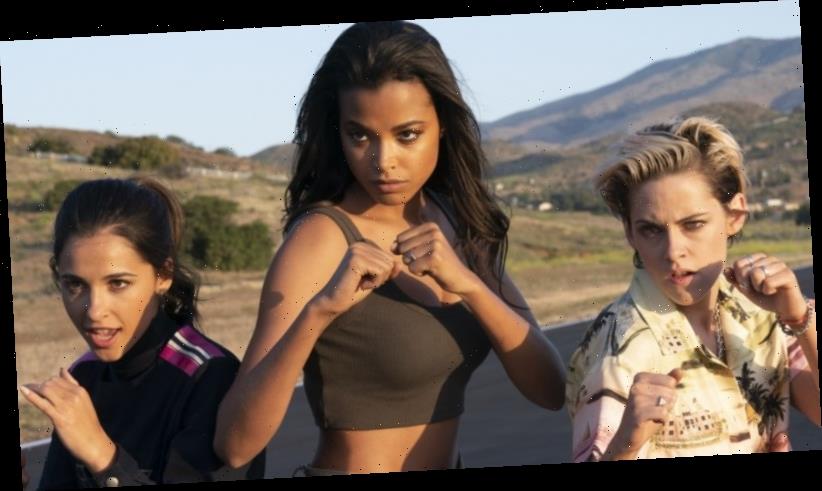CHARLIE’S ANGELS ★★★½
(M) 118 minutes
What most people remember about the TV debut of Charlie’s Angels in 1976 is Farrah Fawcett’s hair. A lustrous halo guaranteed to hold its shape through any trauma, drama or catastrophe, it was proof of the miracles to be performed with a blow-dryer and a magnum of hairspray.
Kristen Stewart, Ella Balinska and Naomi Scott are the new Charlie’s Angels.
The series was brought to the big screen in 2000 with a new team, spawning a sequel before it faded away. Now the Angels are back in a version written and directed by Elizabeth Banks, who’s shaping up as one of Hollywood’s most adaptable talents. Plenty of screen actresses have their own production companies, but few have demonstrated a desire to direct studio action pictures.
Yet this urge should come as no surprise to those familiar with Banks’ work. Perhaps best known as The Hunger Games’ gleefully sardonic Effie Trinket, she has always carried off her comic performances with a sense of mischief and an anarchic glint in the eye. Maybe we should have realised she would eventually get around to wanting to blow things up.
Banks made her debut as a director with the box-office hit Pitch Perfect 2, another story about the virtues of sisterhood and a great box-office success. But she faces quite a job in rejuvenating the Angels for the #MeToo era. The originals were frequently derided by feminists as action Barbies in thrall to their unseen boss, Charlie. And apart from revving up the action, the first movie versions didn’t do a lot to change things.
Banks has tackled the job by doing away with Charlie, but his agency has outlived him, expanding into a global corporation. And Bosley, once the name of his assistant, is now an executive position. There are many Bosleys. The oldest is about to retire, although the fact he’s played by Patrick Stewart means we’ll be seeing more of him. And Banks is cast as the first female Bosley. Appropriately enough, the Angels will be answering to her as their Bond-like itinerary sends them speeding all over the map. A lot of attention is paid to the scenery and the gadgetry, which is supplied by their Q counterpart, Saint (Luis Gerardo Mendez), who also dispenses nutrition advice and wardrobe tips.
The Angels retain residual traces of earlier models. Kristen Stewart’s Sabina is the wisecracking wild card, Ella Balinska’s Jane is the straight-faced one – ex MI6 with a major in martial arts – and Naomi Scott is the new girl, co-opted to the cause after she becomes a corporate whistleblower outraged by her boss’ determination to market the product she invented while it’s still unsafe. Admittedly, Scott is not exactly typecasting for the role of a gifted scientist, but that becomes part of the theme – that it’s a mistake to assess women’s abilities according to their appearance.
The movie opens in Rio de Janeiro with an unrestrained display of the Angels’ variety of talents, beginning with a seduction, concluding with a helicopter getaway and leaving behind a bamboozled gangster and the unconscious bodies of his Praetorian Guard.
We then move on to Germany while Banks gets her main characters arranged on the board. By now, she’s introduced a preponderance of condescending males in need of re-educating and it’s already clear the Angels can’t wait to get started.
The regular eruptions of firepower are choreographed so smoothly you can just about forgive the implausibilities. There’s a jaunty feel to it all, together with a few well-placed plot twists, lots of good-humoured banter and the usual fun to be had from the Angels’ fondness for disguise.
Form-fitting outfits are still a big feature of the package, but the emphasis is on “activewear” and the script leaves the team little time for flirting. Camaraderie is the thing and Banks is smart enough to find ways of sending up the original while displaying a nostalgic affection for it.
I can’t say she’s produced a feminist statement or she’s completely justified the decision to revamp such an old chestnut, but Hollywood’s seemingly incurable case of franchise fever means ancient television series remain a primary source of inspiration. It’s a sad inevitability.
Source: Read Full Article

